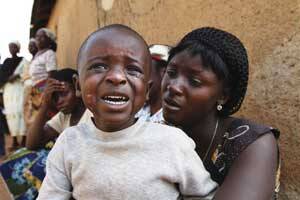Reports suggest as many as 500 people were killed in pre-dawn assaults on three villages close to the city of Jos in the Nigerian state of Plateau on March 7. The area was the scene of similar intercommunal attacks in January.
Many of the victims, which included women and children as young as a 4-day-old infant, were killed by machete as they attempted to flee men armed with guns who were setting fire to homes and churches in the villages. Some died in their burning homes. Initial reports blame the attacks on members of the Muslim Fulani tribe, who work as herders, against the Christian Berom tribe, for the most part farmers.
“My deepest condolences to the victims of the atrocious violence which has bloodied Nigeria and which has not even spared defenseless babies,” Pope Benedict XVI said in Rome on March 10. “Once again, with a sorrowful heart, I repeat that violence does not solve conflicts but only worsens their tragic consequences,” the pope said. “I call all those in the country who have civil or religious authority to work for the security and peaceful coexistence of the whole population.”
Governor Jonah Jang of Plateau State blamed the Nigerian military for failing to respond to his warning that movements of armed men had been reported shortly before the attacks on sleeping villagers, which began at approximately 2 a.m. on March 7. Police have made 200 arrests, but Nigerian human rights groups are concerned that, as in past instances of such interreligious violence, those responsible may never be prosecuted.
Authorities remain worried about retaliation attacks, and a curfew was imposed in Jos, where army units patrolled the streets and sporadic shooting and at least one death were reported. “The atmosphere remains very, very tense,” said Robin Waudo of the Red Cross. “Hospitals are under strain as they still continue to accept the wounded.” Families from villages around Jos have been fleeing in fear of more violence; some were even warned by anonymous phone calls to leave.
Archbishop John Onaiyekan, of the Nigerian capital, Abuja, warned against describing the violence as a religious conflict. He told Vatican Radio that the violence was rooted not in religion but in other differences. “International media will say that Christians and Muslims are killing each other,” he said. “But this is not the case because people don’t kill for religion, but for social, economic, tribal and cultural reasons.
“The victims are poor people who don’t have anything to do with all this and are not responsible,” Archbishop Onaiyekan said. “It is a classic conflict between pastoralists and farmers, except that all the Fulani are Muslims and all the Berom are Christians.”
Adding to the confusion is Nigeria’s current leadership vacuum. President Umaru Yar’Adua returned in February from months of absence in Saudi Arabia where he was treated for an undisclosed illness and continues to recuperate. Vice President Goodluck Jonathon has been acting as president. It is unclear if he is willing to relinquish that role if Yar’Adua recovers.
“The church continues to work toward good relations between Christians and Muslims,” Archbishop Onaiyekan said, “and we try to join together to quell the violence and solve concrete political and ethnic problems.”
The Nigerian government is weak and not able to contain the groups who are vying for dominance of the territory, the archbishop said. Weapons are easy to obtain and the presence of mercenaries “ready to fight for a few dollars” makes the situation volatile, the archbishop said. “We pray for peace, for good government and that the people understand that the only way to survive is to recognize as brothers all the citizens of this country,” he said.








